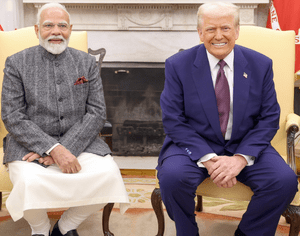New Delhi, Oct 16 (IANS) US President Donald Trump, after an unsuccessful attempt at a ceasefire in Ukraine, is intending wider economic squeeze on Moscow through potential halt in global energy imports from Russia.
In this endeavour, he has chosen to focus on his “good friend” Prime Minister Narendra Modi of India.
Since imposing a large sum of “reciprocal” trade tariff, Trump has been critical of New Delhi for continuing to buy Russian oil.
Two other factors also weigh upon Washington.
One, that sanctions on Moscow since the Ukraine war makes trade with Russia possible only through currency other than the US Dollar, and, losing potential customers of American oil, who could otherwise have added to Washington’s coffers in this crisis.
“India is a significant importer of oil and gas”, where “Ensuring stable energy prices and secured supplies have been the twin goals of our energy policy,” said the Ministry of External Affairs (MEA) Spokesperson Randhir Jaiswal in a statement.
“Where the US is concerned, we have for many years sought to expand our energy procurement. This has steadily progressed in the last decade. The current US administration has shown interest in deepening energy cooperation with India. Discussions are ongoing,” he added.
Even in the US, despite its ban on Russian oil and gas imports since March 2022, some amount has reportedly made its way in through some embargo loopholes.
The White House has since been plugging the loopholes.
Even some NATO allies have been sourcing a major part of their energy requirements from Russia, which an unhappy Trump had termed as “funding the war against themselves”.
Early last month, the US President had called upon European leaders to stop buying Russian oil, said reports, quoting a White House official.
There was a call for a “Coalition of the Willing” nations, led by President Emmanuel Macron of France.
It was all in a quest to coerce Russia’s President Vladimir Putin to sit at the negotiating table.
Though several European countries did stop importing Russian crude between 2022-2023, some, like Slovakia, Hungary, and others, continued.
The European Union’s direct energy trade with Russia fell materially because of sanctions, supply cutoffs, and deliberate policy shifts.
But seaborne oil flows and third‑party routing continued with indirect linkages for some countries and traders.
It is difficult for many NATO countries to cut its several years of regular energy inputs from Russia.
However, the European Commission’s proposed legislation may help phase out Russian energy imports by January 1, 2028.
Realising that an immediate turn in earlier commitments is not feasible, Trump has himself agreed that New Delhi would not be able to halt oil shipments immediately.
While claiming Prime Minister Modi to have assured him of not buying Russian oil, Trump chose to add that it was “a little bit of a process, but that process will be over soon”.
Russia kept exporting substantial crude volumes after February 2022 but redirected major shipments away from Europe toward Asian buyers, especially China and India.
India’s purchases rose sharply after initial months of the war as buyers took discounted cargoes, making India one of the largest buyers by 2023–2024.
Though, Trump has not been as much critical of China despite a recent statement on increasing tariff to 100 per cent, he did say that “Now we’re going to get China to do the same thing”.
Whether Trump can tame the Dragon will be known if and when he meets China Premier Xi Jinping during the Asia-Pacific Economic Cooperation (APEC) in South Korea later.
On India, President Trump has been emphasising his rapport with Prime Minister Modi to boost his own persona, and claim credit for influencing major partners, using personal ties as evidence of effective diplomacy.
Trump, thus, raised the issue to show he had secured concrete foreign‑policy wins and to signal toughness on Russia in an attempt at calling a truce at yet another battlefield.
–IANS
jb/khz
Disclaimer
The information contained in this website is for general information purposes only. The information is provided by BhaskarLive.in and while we endeavour to keep the information up to date and correct, we make no representations or warranties of any kind, express or implied, about the completeness, accuracy, reliability, suitability or availability with respect to the website or the information, products, services, or related graphics contained on the website for any purpose. Any reliance you place on such information is therefore strictly at your own risk.
In no event will we be liable for any loss or damage including without limitation, indirect or consequential loss or damage, or any loss or damage whatsoever arising from loss of data or profits arising out of, or in connection with, the use of this website.
Through this website you are able to link to other websites which are not under the control of BhaskarLive.in We have no control over the nature, content and availability of those sites. The inclusion of any links does not necessarily imply a recommendation or endorse the views expressed within them.
Every effort is made to keep the website up and running smoothly. However, BhaskarLive.in takes no responsibility for, and will not be liable for, the website being temporarily unavailable due to technical issues beyond our control.
For any legal details or query please visit original source link given with news or click on Go to Source.
Our translation service aims to offer the most accurate translation possible and we rarely experience any issues with news post. However, as the translation is carried out by third part tool there is a possibility for error to cause the occasional inaccuracy. We therefore require you to accept this disclaimer before confirming any translation news with us.
If you are not willing to accept this disclaimer then we recommend reading news post in its original language.

